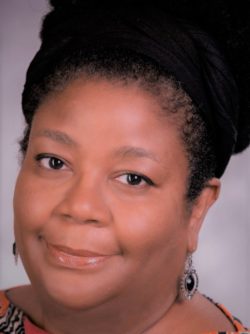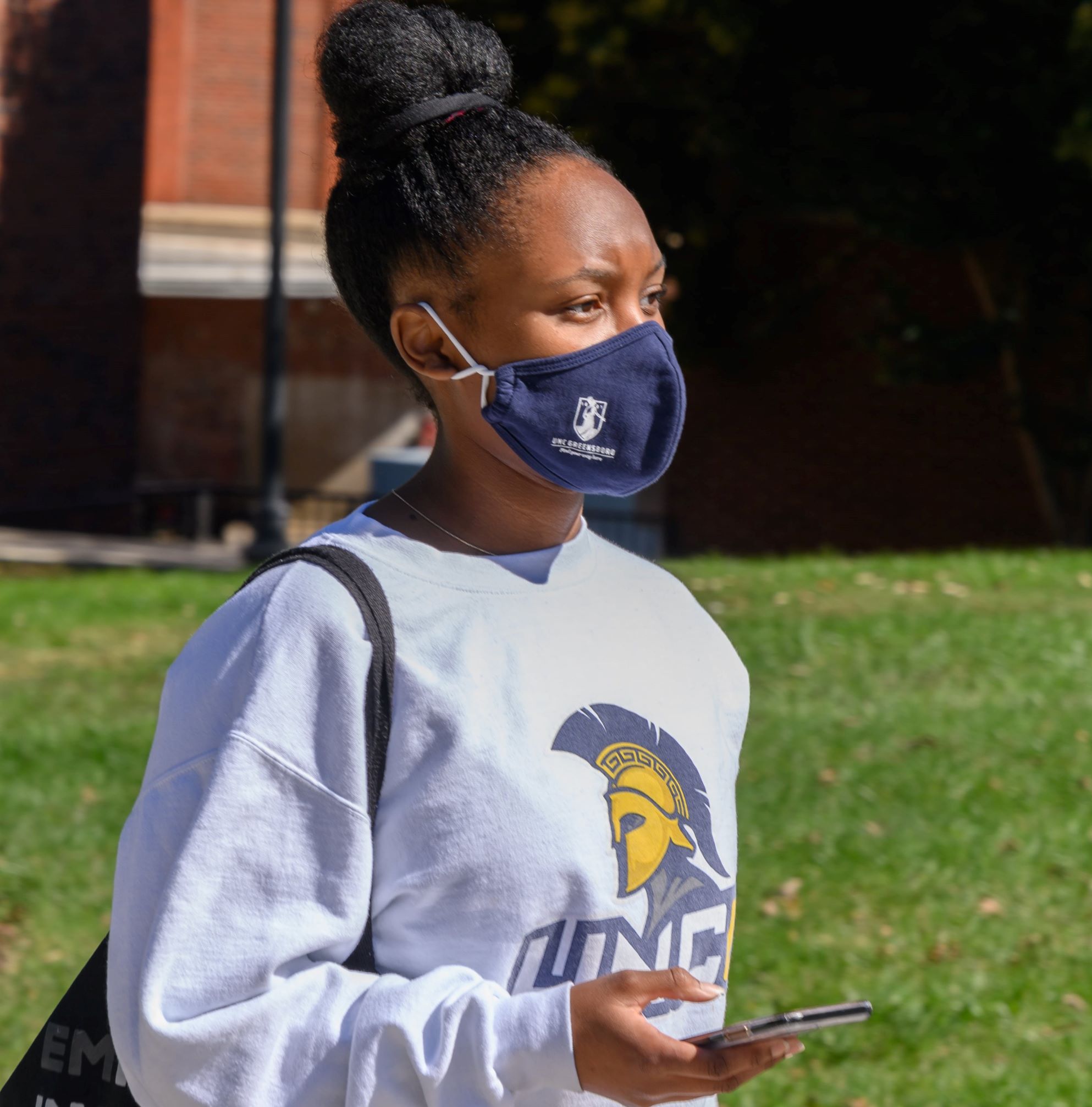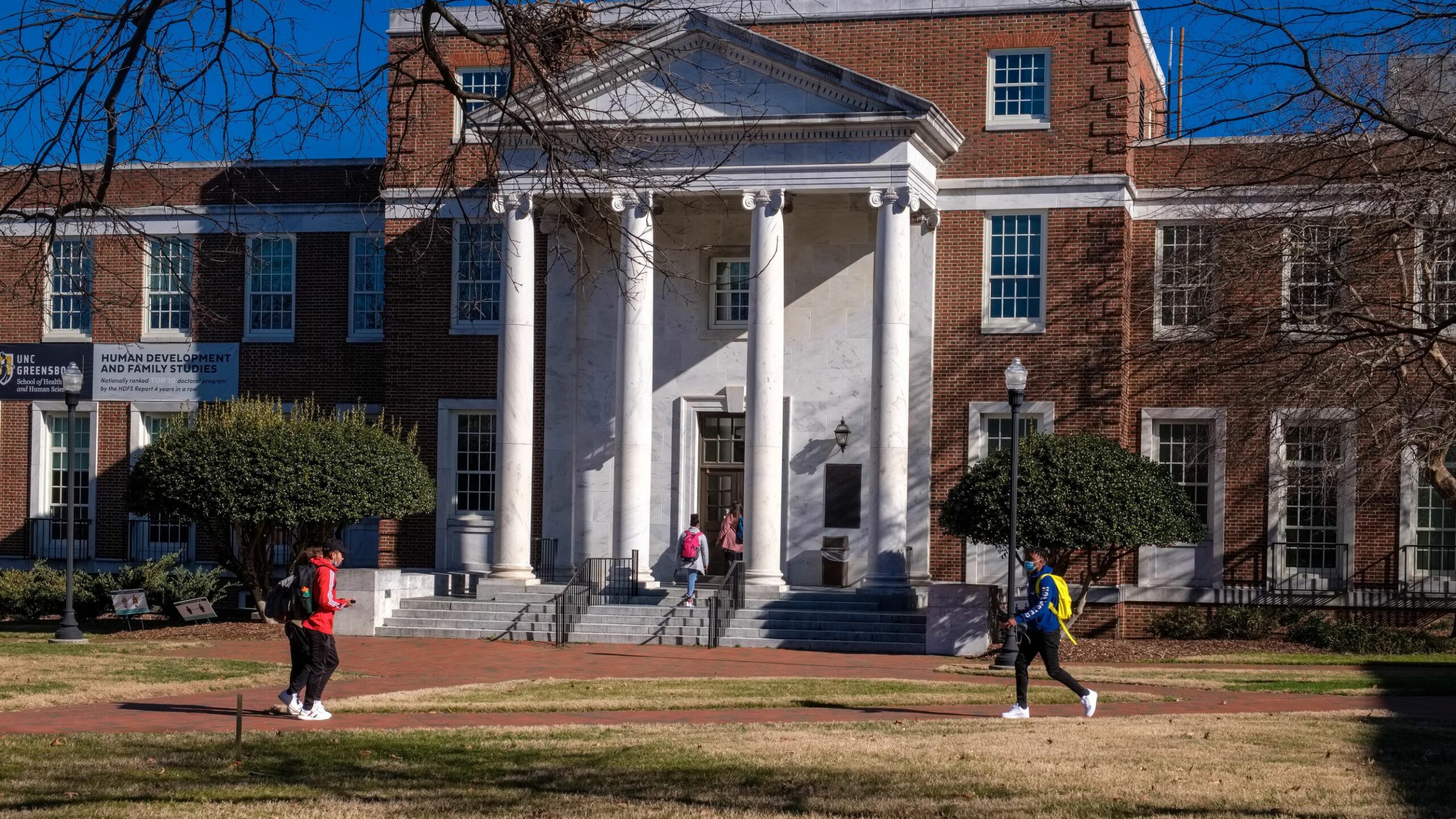When the George Floyd murder occurred on May 25, 2020, it took less than 24 hours for protests over police violence to begin. A week later in more than 500 cities, nearly a half million people had organized and rallied around the Black Lives Matter movement calling for justice and change.
Those moments became a turning point for the nation and in many ways too for the University of North Carolina Greensboro, an institution that already had been making big commitments to address diversity, inclusion, social justice and racial equity.
From 2015 to 2020, the university had nearly doubled its African American faculty, while boosting its hiring of nonresident, Hispanic and Asian faculty. Greensboro had become a place where conversations and dialogue were happening. But the Floyd murder and the public horror of it prompted the university to “double down” on its efforts.
Backed by powerful statements from its Chancellor Dr. Franklin Gilliam Jr. as well as an outpouring of support from its departments, deans and other faculty, UNC Greensboro got to work further developing a “safe space” for its community to have very tough and very honest conversations. Included in that mission was the vision for a new website dedicated to continuing the social movement that would be focused on achieving racial equity.
Dr. Andrea Hunter, a professor of human development and family studies, was chosen to lead the effort, a prudent selection whose respected research work and eloquence led to her installments as Chair of the Faculty Senate, Chair of the Provost Search Committee and Director of the School of Health and Human Sciences’ Diversity and Inclusion Office.

Dr. Hunter, who was named Chancellor’s Fellow for Climate Change, and colleague Dr. Julie Mendez Smith went to work, developing a plan that included building out the signature Racial Equity website – which has become a go-to resource and connection portal for those interested in the movement – along with Black History Month events and those that will follow.
To learn more about the historic significance of that work, the power of their collaborative efforts and her thoughts on that fateful day last May, University Business sat down with Dr. Hunter for an enlightening and moving conversation:
2020 was a trying year and yet a year of massive change, notably the social justice movements that came after the George Floyd murder. Can you talk about that moment, the aftermath and the massive response to it?
The tragic and public murder of George Floyd by the Minneapolis police was one of those events that was an inflection point, or a turning point, as a society. It was not just the horror of it but that we bore collective witness to it. In a moment of stillness because of the pandemic, it was also a moment of collective vulnerability. We came to understand it as a human tragedy in a deeply personal way. We saw perhaps with new eyes or ways that we hadn’t for a very long time, the profaneness of racism in our nation.
More from UB: Racial Equity, a website to behold at UNC Greensboro
When I see the national and global social movements, the marches, I see them as expressing the pain, the outrage and the grief of that moment, but also hope. The hope that we can do better and demand that we do better. I think it changed the nation because it changed us. It was deeply, deeply emotional in a way that perhaps we hadn’t experienced in a very, very long time in this country.
Had this awakening, or reckoning perhaps, been building in this country?
There are ways of reckoning throughout American history. You think about that as a wave and how it gathers energy as it moves onto shore. Over time, that shore gets reshaped and that energy builds. And every now and again, there’s a hurricane that completely transfigures what was there before. If you think about the origins of the Black Lives movement, which is obviously a continuation of racial protest movements before the 20th century, there is a historical evolution and then we roll up and take the shore. In other words, we can’t separate this moment from all those moments that came before. It’s all connected.
And yet, we’re still in this moment. We’re still seeing resistance to these movements.
If you want to keep with my analogy of a wave coming into shore, it also recedes, and then goes back and develops and builds this energy. And so it is, often with social change.
As protest movements were gaining steam with students very much at the core, the influence that institutions had, and have now, are undeniable. What were some of the discussions UNC Greensboro and other universities were having?
 Colleges and universities were looking within and engaged in their own critical reflection, about their role in systemic racism, including the expressions on our campuses: How can we be a part of the solution in new ways? How can we address this on our campuses in areas where we fall short? How can we, with our considerable resources, be a part of that moving forward around racial and social equity. What is our responsibility? What is our commitment? We have said as institutions of higher learning that these are deeply important values, so how can we act on them?
Colleges and universities were looking within and engaged in their own critical reflection, about their role in systemic racism, including the expressions on our campuses: How can we be a part of the solution in new ways? How can we address this on our campuses in areas where we fall short? How can we, with our considerable resources, be a part of that moving forward around racial and social equity. What is our responsibility? What is our commitment? We have said as institutions of higher learning that these are deeply important values, so how can we act on them?
Over the summer, there were conversations that were going on via email and other places about where we were. And those statements [the department statements across UNC Greensboro calling for change listed on the Racial Equity website] give a sense of what that looks like. In what ways do we want to hold ourselves accountable?
We have a deep responsibility to our students. I had students contact me over the summer and want to talk about it or wondered if I would hold a Zoom session so they could process it. I had students ask me to send them things to read. So, there was no way to step outside of that. You can’t hold other folks accountable until you hold your own self accountable. It was critically important for universities to do that, to be authentically part of where we as a nation were saying we wanted it to go.
Many colleges and universities have talked up diversity, equity and inclusion as the centerpiece of new initiatives on their campuses in the past year or more. What would you like to see more of from higher education as a whole?
This is a challenge for all colleges and universities. We need to be a place where the values of equity, diversity and inclusion are not only what we say but what we do. And more, it has to be who we are, such that it’s a part of our DNA. It’s difficult, even for universities, to close that gap between our stated values and our actions. So, we have to continually challenge ourselves, push ourselves, break through the inertia, the resistance to do better, to be better.
And also, this generation of students is not having it. No more talk just do. They will push us. We’ve got to be ready to respond or we’re not relevant. To maintain and sustain that commitment is what I would like to see from all our institutions of higher education. To make good on all those promises you’ve made in that moment of great pain. I am hopeful that’s what we will do.
What can the true embrace of those mission statements, the vision of racial equity and inclusion, do for a college or university?
When I talked with [the community via a large online session], I told them that diversity is our superpower, as humans. That is how we adapt. That’s how we survive. That’s how we innovate. And we have to unlock that potential. Then we have to harness it. And if we can do that without dampening it, the result is excellence and equity. When we don’t unlock the potential of diversity, there are productivity and efficiency costs. There are opportunity costs. There are innovation costs. There are ethical and moral costs. Our challenge is to be able to address that up front and unlock that potential.
What does it do for a university? It makes us better. It makes us more excellent. It makes us more responsive to the world in which we live. It helps us serve our students and the community that we are a part of. Educational institutions are also aspirational. It’s not just about a student’s aspiration or a family’s aspiration. We are aspirational in the sense that we can help be a part of wherever that place that we’ve collectively said that we want to be “ and that includes forming a more perfect union where the dignity of all of us is affirmed.
What does it mean to exist in that place, as a person and as a university there’s a lot of power in that. It’s not easy to get to. But there’s purpose in that. And it helps fulfill our broad mission.







